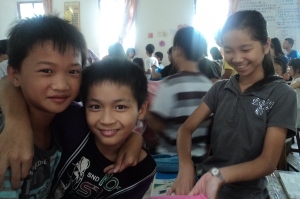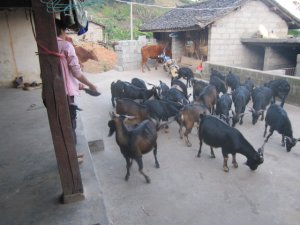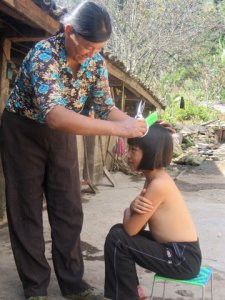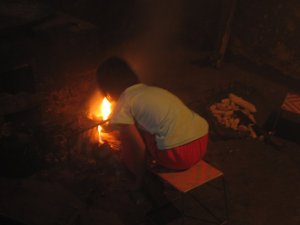Zhang Yibin was a shy student at Helong Middle School in Shantou, Guangdong who rarely participated in class. Read how Jennifer Tan (Fellow ’11, Brown University) was able to change his beliefs about himself and his education.
Ross (Zhang Yi Bin 张奕槟) is one of the 78 students in my class. On the first day of
class, I noticed him right away–he was the smallest student, sitting by himself with his notebook open. I crouched down next to his desk and asked him for his name. He just looked away and pointed at his notebook with three Chinese characters written on top. I asked again and he whispered in my ear without looking at me, “Yi Bin.” I smiled and walked away. After a few days of class, I realized that Ross had a very poor foundation in the English language, but he concentrated hard in my class, copying everything down as quickly as he could. After a week, I announced that I had chosen Ross to serve as the class’s subject representative. This was abnormal, as class representatives are typically chosen based solely on grades, and Ross’s grades were far from the best in the class. I hoped that giving Ross the responsibilities of serving as class representative, which include helping me to collect homework, would help him open up. I had no idea how much my decision would affect him.
By the beginning of October, I began buke 补课( supplementary study sessions) every day after school. Almost every day, Ross and his good friend, Marshall, would come into my office with their notebooks, English workbooks, and English textbooks in hand, asking me to review the day’s materials or to learn more vocabulary. I was energized and inspired by their eagerness to learn. They spent more than an hour with me every after school session working on grammar problems and writing creative sentences with the words we just learned. In September, Ross averaged just 71 out of 150 in my class. In his last exam, he scored 102 out of 150. In class, he constantly raises his hand to answer questions, and even frequently volunteers to perform dialogues in front of the entire class! Ross inspires me to work harder for all 77 of my other students.
Recently, his Chinese Literature teacher (another Teach For China Fellow) showed
me an entry in his diary. The prompt was: “Your teacher calls you into his/her office. What happens next?” Ross wrote a creative piece about how nervous he had been to be called into the office by his English teacher, and how sweat had trickled down his forehead as he walked to the office. The story continued: “I didn’t know what to do so I just addressed her and stayed silent. She told me that she wanted me to be her class representative! I couldn’t believe it! I was scared at first! But after a few days, it didn’t seem so hard to help her! When I was younger, I did not work very hard in school, but my teacher told me that she believes I could succeed if I work hard, so this year, I am going to work very very hard! She makes us read the giant banner in our classroom every day: I will work hard, I will succeed! I think this is true!”
I was touched by what Ross wrote. I didn’t know that I could have such a big impact on another human being in such a short amount of time. Ross isn’t a high-achieving student; not yet, at least. I know that if he were in a different class, he might not have been encouraged as much. In another class, he certainly wouldn’t have received after-school sessions to reinforce difficult material. Most of all, the teacher might not have told each and every single student that he/she believes in them. I Teach For China because I truly believe in all my students, and if I could help Ross believe in himself, I only have 77 more to go.


















